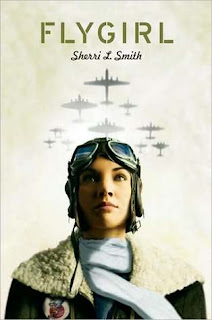Flygirl
Sherri L. Smith
Putnam's
2008
I thoroughly enjoyed this book. Every last part of it. If you're looking for a great coming-of-age story, a story which deals with a seldom discussed racial issue, a story that shows an oft overlooked part of history, a story with a winsome and believable main character, a story with a hint of romance, a story with lots of adventure, a story with flying and military history--then this is the book for you!
Ida Mae Jones, aka "Jonesy," is 18, African American, and a wannabe pilot. She knows how to fly, but in the 1940's, women rarely get their pilot licenses, African Americans (female or not) even more rarely. When the war comes along, even poor strawberry farmers in Louisiana want to do their part; Ida Mae's older brother enlists and heads off to fight. She's left behind cleaning houses and saving nylons with her best friend, Jolene. Until...
younger brother Abel shows Ida Mae an advertisement about the WASP program. And Ida Mae hatches her daring plan: she's light enough to "pass" for white and she knows how to fly. One bold interview with a white woman, several arguments with her mother and grandfather about the dangers ahead of her, and a long train trip later, she lands at WASP training grounds in Texas, a state that is most unfriendly to African Americans.
Throughout this moving novel, Ida Mae wrestles with loneliness, with not being able to be fully herself with any of her friends or family, and with who she really is. Smith covers these emotional waters well, peppers the story with terrific details about the WASP program, and lets Ida Mae really grow up.
On top of the great story aspects, Smith handles the myriad racial and gender issues without bitterness, with wonderful honesty, and with historical appropriateness. So often, we read historical fiction that places anachronistic emotions into the main characters; in Flygirl, I felt like Ida Mae really could have lived and felt the way she did. She's a character to admire for standing up for herself, for her bravery, and for her genuine love of family and friends. The open ending is perfect. The truth in this story is how Ida Mae handles this often tumultuous coming-of-age experience with respect for her family and friends, with her willingness to sacrifice, and with her desire to do and be what she was created to do/be--for the present time. There seems a clear realization that this may only be temporary (her ability to fly), but that she is content nonetheless.
If you are interesting in women's aviation and/or WWII, you might also check out Code Name Verity.
Recommended for Young Adult (8th grade and up)
Book cover image from goodreads; book from my local library
Things to Note/Discuss
- Is it okay to lie about your identity for a good cause? No good answer here--you might talk about Bible smugglers such as Brother Andrew, missionaries with assumed identities in sensitive countries, and the like.
- When, if ever, is it appropriate to disagree with your parents? How does Ida Mae handle this dynamic? Is she respectful of her mother/grandfather even when she disobeys? (the answer, of course, is yes: when a young adult is as old as Ida Mae, he or she must be making choices as an adult... and Ida Mae does this gracefully, I think)
- Do you like the novel's ending? What do you think happens to Ida Mae? To her relationship potential with Walt Jenkins? To her friendship with Jolene?

No comments:
Post a Comment
We love comments! Prove you're a real person, please.